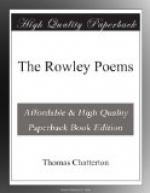As onn a hylle one eve fittynge
At oure Ladie’s Chyrche mouche wonderynge
embodies this truism fit for a bread-platter—or to be the ’Posy of a ring’—’Do your best.’
Canynges and Gaunts culde doe ne moe.
And the poet’s boyishness demands still further consideration. He has a crude violence of expression which is apt to shock the mature person—some of the descriptions of wounds in the two Battles of Hastings would sicken a butcher; while in another vein such a phrase as
Hee thoughte ytt proper for to cheese
a wyfe,
And use the sexes for the purpose gevene.
(Storie of William Canynge)
has an absurd affectation of straightforward good sense divested of sentiment which could not appeal to any one on a higher plane of civilization than a medical student.
And this is easily explicable if only it is borne in mind that the Rowley poems were written by a boy, and that such lovely things as the Dirge in AElla suggest a maturity that Chatterton did not by any means perfectly possess. In some respects he was as childish (to use the word in no contemptuous sense) as in others he was precocious. And it is a thousand pities that the difficulties of Chatterton’s language and the peculiar charm and invention of his metrical technique cannot be appreciated till the boyish love of adventure, delight in imagined bloodshed, and ignorance of sentimental love, have generally been left behind. Nothing—to give an example—could be more frigid than the description of Kennewalcha—
White as the chaulkie clyffes of Brittaines
isle,
Red as the highest colour’d Gallic
wine
(an unthinkable study in burgundy and whitewash, Battle of Hastings, II, 401); nothing, on the other hand, more vivid, more obviously written with a pen that shook with excitement, than




